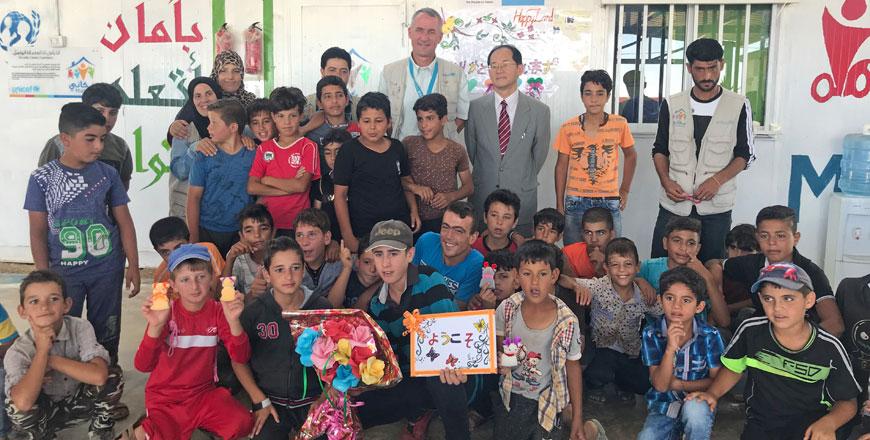You are here
Japan extends additional $1m emergency grant for UNICEF work in Azraq Camp
By Suzanna Goussous - Jul 30,2018 - Last updated at Jul 31,2018

Japanese Ambassador to Jordan Hidenao Yanagi poses for a group photo with children from Azraq camp on Monday (Photo by Suzanna Goussous)
AZRAQ — Japan will continue to provide support to Jordan as long as Syrian refugees reside in the Kingdom, to share the international responsibility towards them, said Japanese Ambassador to Jordan Hidenao Yanagi, as Japan extended an emergency grant of $1 million to UNICEF Jordan on Monday.
“The government of Japan decided to provide an additional emergency grant assistance of $1 million to UNICEF in May 2018 for the project titled ‘Lifesaving health and nutrition service for Syrian children and women in Zaatari and Azraq camps,” the ambassador said during a visit to Azraq Camp.
“We believe that it is crucially important for pregnant and lactating women and children who are living in the camp to ensure access necessary [to] lifesaving health and nutrition service and this project will support some estimated 43,000 women and children,” he added.
The ambassador noted that, under the grant, Syrian women and children will have more access to necessary medical services including pediatric consultations, immunisations and nutrition services provided by UNICEF and its partners.
In February, Japan extended a grant of $17.5 million to international and non-profit organisations in Jordan, with $2 million being allocated for assistance of vulnerable Syrian refugees.
Since the onset of the Syrian crisis, Japan has extended $190 million for international organisations' activities in camps across the Kingdom. It also provided Jordan with $1 billion as bilateral assistance, the ambassador stated.
“Apart from the international organisations, our priorities are mainly the water supply; we have many projects going on, especially in the northern part of Jordan, where many refugees from Syria reside, because of the need for water in host communities,” he told The Jordan Times.
UNICEF Representative to Jordan Robert Jenkins said the government of Japan has been “a very close partner of UNICEF from the beginning of the crisis”, adding that the Japanese people have “created a very tangible difference for the most vulnerable children in the country”.
Jenkins commended Jordan’s efforts in opening its borders for Syrian refugees and hosting them in the Kingdom, highlighting the day-to-day efforts of the Syrian refugee administrative department and its humanitarian commitment towards the crisis.
He stressed that the implementing partners for the pediatric ward at the camp’s hospital — the International Medical Corps and the Ministry of Health — "paved the way for impressive results", with high levels of care provided for deliveries and ongoing care for children at the camp.
Levels of healthcare at the camp include village-level primary care, secondary level hospital for residents from all villages and, for severe cases, the referral of patients to a hospital outside the camp, according to pediatricians.
The average number of deliveries per month at the camp amounts to around 130 babies, pediatricians said.
The ambassador later visited the UNICEF Makani Centre, where children are offered learning support services through community-based programmes for child protection, early childhood development, participation of youth and adolescents, in addition to life skills training and access to innovation labs, according to UNICEF.
There are 9 Makani Centres currently operating in Azraq Camp, benefiting around 4,000 children aged between 6 and 18 who are enrolled in the centres.
As of this year, UNICEF initiated a community-based plan to “fulfill its vision for Makani Centres to be self-sustained by Syrian staff”, in addition to the empowerment of children residing in refugee camps through various programmes.
The tour also included a visit to the health and nutrition clinics of village 3 at the camp, where Syrian children and mothers are treated.
As of last month, there were around 36,547 Syrian refugees residing in the camp, nearly 22,893 of whom are children, and 12,711 are school aged, according to official data.
Related Articles
AMMAN — South Korea announced on Monday that it would contribute $600,000 to support the implementation of Makani activities by UNICEF Jorda
AMMAN — A Makani centre was opened at the Zaatari Refugee Camp on Tuesday, operated by UNICEF and funded by Japan, the Japanese embassy said
AZRAQ — Around 28,000 school students from Zaatari and Azraq refugee camps are currently preparing for a new academic year, despite recent r
















